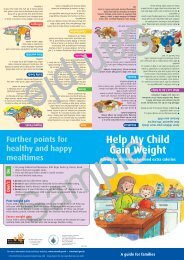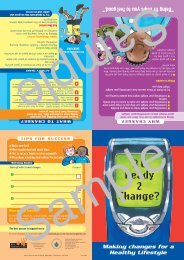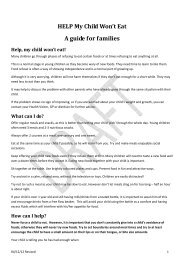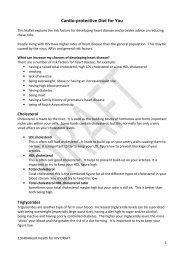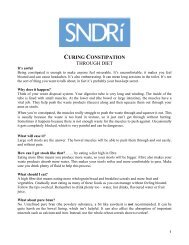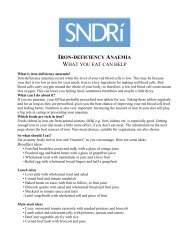My Child Still Won't Eat Review Draft - NDR-UK
My Child Still Won't Eat Review Draft - NDR-UK
My Child Still Won't Eat Review Draft - NDR-UK
You also want an ePaper? Increase the reach of your titles
YUMPU automatically turns print PDFs into web optimized ePapers that Google loves.
<strong>My</strong> child still won’t eat!<br />
A guide for parents and health care professionals<br />
Are you concerned about your young child’s eating behaviour and slow or uneven weight gain<br />
This leaflet is designed to be used by parents with health care professionals along with the leaflet ‘Help, <strong>My</strong> <strong>Child</strong><br />
Won’t <strong>Eat</strong>’ (Also available from <strong>NDR</strong>-<strong>UK</strong>).<br />
Is your child:<br />
• Refusing to eat<br />
• Getting upset at mealtimes<br />
• <strong>Eat</strong>ing very small amounts<br />
• Playing up at mealtimes<br />
• Often miserable or poorly<br />
Have mealtimes become:<br />
• A battle<br />
• Very long<br />
• Frustrating and stressful<br />
• Worrying<br />
• Non-existent<br />
These things happen in most families at some point, but if they have been happening regularly for several weeks and<br />
you answered ‘yes’ to a number of the questions listed, then your child may have a ‘feeding difficulty’.<br />
A ‘feeding difficulty’ is different from ‘faddy’ eating and doesn’t usually go away by itself. It often means that<br />
children are eating too little to grow and develop as expected. For families who have a child with feeding difficulties,<br />
food and mealtimes often become unpleasant and uncomfortable experiences for everyone. So for things to be<br />
different, eating needs to be more enjoyable. This booklet suggests ways to help you make this happen.<br />
Comments from parents and carers who have successfully sorted out their young child’s<br />
feeding difficulties.<br />
“We thought we were the only ones- it was such a relief to know that other people were also struggling to feed their<br />
children”.<br />
“It isn’t your fault- you must not blame yourself”.<br />
“You need the right sort of information and support- not just general advice”.<br />
“You aren’t the only ones and with persistence it can get better”.<br />
How would you like things to be<br />
When you are beginning to plan changes it is helpful to be as clear as possible about how you would like mealtimes<br />
to be.<br />
• Do you want your child to be feeding himself or herself<br />
• Who do you want to be there at mealtimes<br />
• Where do you want everyone to sit<br />
04/12/12 Revised 1
• Where do you want your child to sit<br />
• How long do you want a mealtime to last<br />
What it’s like now<br />
It’s important to begin by thinking about what actually happens at the moment. It may help to put yourself ‘in your<br />
child’s shoes’.<br />
• Is there a regular pattern to meals<br />
• How often do you offer food and drink (through the night as well as during the day)<br />
• Is your child having lots to drink<br />
• Does your child know when to eat and what to eat<br />
• Does your child know how to do what you want him or her to do – (for example, use a spoon or put food into<br />
his or her own mouth)<br />
• Does your child know when you are pleased with him or her<br />
• Does your child or yourself hear conflicting messages from different people<br />
“You have the right as a parent to set your own routine at mealtimes.”<br />
Doing things differently<br />
Think about the following questions to give yourself some clues about what you could do differently at mealtimes.<br />
It’s important to take account of your child’s stage of development when you consider your answers. It can be<br />
helpful to talk about the questions with your partner or anyone else who helps you to care for your child.<br />
Q-Are there distractions around which prevent your child from concentrating on his or her food<br />
For example:<br />
- Is the TV or DVD on<br />
- Are you playing games together<br />
- Does your child have things to play with at mealtimes<br />
- Are there other people around who are not eating<br />
Early in their development, very young children can only concentrate on one thing at a time. If you want them to pay<br />
attention to their food and eating you need to remove anything which may take their attention away from this.<br />
Q-Is your child getting lots of attention for not eating<br />
For example:<br />
- From things that you and others say;<br />
- From things that you and others do; or<br />
- From the way that you and others look.<br />
Q-How does your child know you are pleased with him or her<br />
Q-What could you and others do or say to let your child know that you are pleased when they show an interest in<br />
and eat their food<br />
Q-What could you and others do instead of giving attention to your child when he or she doesn’t eat<br />
Because parents or carers worry when their child is not eating enough and is playing up at mealtimes, they often<br />
(without realising it) give him or her lots of attention when he or she is not eating.<br />
04/12/12 Revised 2
<strong>Child</strong>ren are more likely to carry on doing things which get noticed- even if the attention is you being cross or fed up<br />
with them. Talking to someone else about your worries, in front of your child, is also a kind of attention.<br />
It’s important to give your child attention for the type of behaviour you want so that they will behave in that way<br />
more often.<br />
The types of behaviour which don’t get attention are likely to happen less as time goes by. You might need to start<br />
giving praise and attention when your child sits still or stops crying (because until he or she does these things, there<br />
is little chance that he or she will eat). Then try to give lots of praise and attentions when your child shows any kind<br />
of interest in their food. Try not to give attention when he or she is not showing interest in his or her food. This is not<br />
as easy as it sounds, and things usually start off by getting worse. This just means that your child has noticed that<br />
things are changing and is trying to get you to go back to doing things the old way. If you can stick to the new way- it<br />
works!<br />
Young children like to please their parents and carers. When they see you are pleased with something they’ve done,<br />
they are likely to do it again. So it’s important to be really clear about what has pleased you when you are praising<br />
your child. (For example, “Look at you! In your chair already- that was quick, good girl!” “You’ve eaten all your rice<br />
and peas- aren’t you good!”) This type of praise really works in encouraging the behaviour you want from children.<br />
If at an appropriate age you could use a sticker reward chart to encourage your child to try new foods.<br />
Not everyone finds it easy to give praise and it may feel a bit odd or false to praise your child like this.<br />
Some people have found that it helps to practice how to praise with their partner or a friend.<br />
“In order to get the behaviour you like, you need to praise the behaviour you like and ignore the behaviour you don’t<br />
like”.<br />
“At first I felt really silly when I had to praise my little boy- but then I thought ‘there’s only him and me to hear it and<br />
if it’s going to help I’ll do it’. And it did help, and gradually I got used to doing it”.<br />
Remember that as well as the words you say, praise and attention includes looking at your child, smiling at your child<br />
and letting him or her hear you telling someone else how pleased you are.<br />
Managing Meal Times<br />
Young children need to receive very clear messages about what you want them to do at different times. It is very<br />
helpful to have the same signals or routines to let them know that it’s time for a meal to begin or end.<br />
(For example, “When I’ve put the plates on the table it will be time to wash your hands for dinner”, “when we’ve<br />
all finished our drinks you can go and play”.)<br />
Young children with small appetites need food and drink ‘little and often’. Aim for three main meals a day with a<br />
mid-morning and mid-afternoon snack spaced at regular intervals.<br />
It is helpful to offer two courses at each meal. This gives two chances for your child to take in extra calories, and the<br />
second course should be offered but try to get them to take some of their first course. It is important to set<br />
boundaries around meal times i.e. getting your child to take a bite size of the food or getting them to place some<br />
food on their lips, letting your child know they can’t avoid taking the food and offering praise when the do take it,<br />
positively reinforcing this acceptance. If the second course is a pudding, remember to make it clear that it is not a<br />
reward for eating the first course- it’s just another chance to take in calories. It is also helpful to give your child a<br />
small portion which he or she may be able to finish, and so receive lots of praise and attention. You can then offer a<br />
second helping.<br />
04/12/12 Revised 3
New tastes or textures may need to be given more than 10 times before your child will take them. So don’t give up<br />
too soon if it seems as if your child doesn’t like a new taste or texture.<br />
Starting to change things<br />
Once you have decided on the changes you want to make- think about the following before you begin.<br />
Q-How can you make sure that everyone who is involved in your child’s mealtimes sticks with the same rules that<br />
you are trying to set<br />
Q-Who will support you while you are making these changes<br />
It may be useful to include your partner, anyone who helps care for your child and your health visitor when you are<br />
making a plan to manage the changes you have decided on. they may be able to help you carry out your plans. At<br />
the end of this booklet there are pages where you can write things down so that everyone can be clear.<br />
It is a good idea to think about which difficulties you want to tackle first. Trying to make lots of changes all at once is<br />
very confusing for young children and hard work for you, so decide on some small steps which you can build on later.<br />
For example, you might begin with getting your child (and anyone else) to sit in the places you have decided. It will<br />
then be easier, a little later on, for you to concentrate on encouraging your child to eat.<br />
Mealtimes will need to be managed in the same way no matter who is there, so that your child always gets the same<br />
messages about what is expected of him or her.<br />
“With two parents, you need to agree between you what you are trying to achieve and write it down in minute detail<br />
so it is clear to both of you- it’s important to invest at the beginning”.<br />
“I was really impatient to get on with it, but doing things one step at a time really paid off”.<br />
“I was really worried that nothing would change, but making sure that we’d succeeded with one or two small things<br />
before moving on to the next helped me see that I could do it”.<br />
<strong>Review</strong>ing your plan after a time (perhaps a month) might help you see any changes which have begun to happen.<br />
You may also need to make small adjustments to your plan at this point. Don’t be tempted to change the plan after<br />
only a few days if things are getting worse. Stick with it!<br />
Remember- there are no ‘overnight miracles’. It takes time and hard work to make the change which will enable<br />
your child to eat more. It can be done!<br />
“You can’t make a child eat- you can’t force it, you can only sow the seeds. You need patience and that will bear fruit<br />
in months to come”.<br />
“With hard work and persistence there is a way through and your child will eat”.<br />
If we want young children to behave differently, the adults around them must first behave differently.<br />
“Parents should retain or take control at mealtimes- eating should be fun (that doesn’t mean a riot!)- and control is<br />
not a bad thing”.<br />
When we begin to change the way we manage children’s behaviour, their behaviour will probably get worse before<br />
it gets better. This is a good sign – so persevere! It means that your child has noticed that things are different and is<br />
testing out the new rules and limits.<br />
“With many small steps you can make a big change”.<br />
04/12/12 Revised 4
Think positive! Ignoring the behaviours you don’t want and giving positive attention for the ones you want to<br />
increase will help to make mealtimes more enjoyable.<br />
“We don’t dread mealtimes any more- they’re peaceful and no fighting”.<br />
“He’s more happy and relaxed altogether now- eating better- gaining weight, we’ve got our confidence back”.<br />
“<strong>My</strong> whole attitude to discipline has changed and I shout less. We’re all more relaxed”.<br />
It is not helpful to leave food and drink around all day while your child is busy playing. This gives a mixed message<br />
about what he or she is expected to do- do you want him or her to play or eat<br />
Q-How could you clearly show your child what you would like him or her to do at mealtimes<br />
Lots of children eat on their own in front of the TV, but they need to see others eating and enjoying their food if they<br />
are to learn that eating can be fun.<br />
“<strong>Child</strong>ren learn from what they see, not from what they are told- for example, it helps when she could see us all<br />
sitting down together as a family to enjoy eating together”.<br />
“To encourage your child to enjoy food, try to set an example and try to make mealtimes an enjoyable social<br />
occasion”.<br />
Q-How does your child know when it is time to eat, and how does he or she know when mealtime is over<br />
“<strong>Child</strong>ren like to know the rules and the limits- this applies not only to behaviour in general but also to mealtime<br />
behaviour”.<br />
As many calories as possible<br />
Q-Are there any foods that you know your child will always eat<br />
When children are underweight and not eating well they need as much energy (calories) as possible in the food you<br />
give them. Choose the highest calorie foods and drinks for your child and avoid using ‘low fat’ or ‘low sugar’ foods as<br />
these are also low in calories.<br />
If there are any high calorie foods that your child likes, regularly provide these at meal or snack times. Knowing that<br />
the foods your child is eating have a lot of calories in them can help to reduce stress at mealtimes.<br />
You may already have ideas about how you can increase the calories in your child’s food and you could also ask your<br />
health visitor or family doctor for advice- they may refer you to a Dietitian for further ideas.<br />
“You have to put to one side what you have learned about healthy eating for adults and recognise the importance of<br />
fats and sugar for small children”.<br />
“We needed to know that, in the short term, calories are more important than variety or how to promote good eating<br />
habits”.<br />
04/12/12 Revised 5
Action Plan<br />
Remember- take small steps, and things are likely to get better.<br />
What don’t you like about mealtimes now<br />
(For example, ‘very long’, ‘a battle’.)<br />
When do you offer food (Give times.)<br />
When do you offer drinks<br />
(For example, whenever he or she wants, with meals or snacks.)<br />
Who else is there at mealtimes<br />
Where does your child sit for his or her meals<br />
(For example, in a highchair in front of the TV, at the table.)<br />
Where do you (or whoever is feeding your child) sit<br />
(For example, next to him or her, you don’t sit down.)<br />
Does your child have the chance to feed himself or herself (if old enough)<br />
What do you talk about at mealtimes<br />
(For example, do you talk only about food and behaviour at mealtimes)<br />
How does your child know that you are pleased with him or her<br />
(For example, when you smile, give praise and so on.)<br />
04/12/12 Revised 6
How would you like things to be<br />
How long do you want mealtimes to last (For example, 30 minutes.)<br />
When will you offer drinks (For example, at the end of each meal and at snack times.)<br />
What kind of foods will you offer that you know your child likes and will increase the number of calories eaten<br />
Who else will eat at the same time<br />
Where will you sit<br />
Where will anyone else sit<br />
Where will your child sit<br />
04/12/12 Revised 7
What will you (or others) do or say if-<br />
Your child keeps getting out of his or her seat at mealtimes<br />
(For example, bring him or her back to their seat and remind them that this is time to eat; think about using a<br />
harness to keep him or her seated.)<br />
Your child keeps spitting out his or her food (For example, remember that behaviour which doesn’t get attention is<br />
likely to happen less as time goes by.)<br />
Your child keeps crying or has a tantrum<br />
Your child wants food or drinks at other times (For example, remind him or her that it will be time for a drink after<br />
you’re done, and then suggest a new activity.)<br />
You feel very cross (Make sure that your child is safe and then move away, perhaps into another room and give<br />
yourself a few moments to cool down.)<br />
What will you do when you want to ignore the behaviour you don’t want (For example, look away- while making<br />
sure your child safe by peeping out of the corner of your eye- talk to someone else about something else.)<br />
What will you do when you want to encourage the behaviour you see<br />
(For example, what happened at toddler group, feeding the ducks, what you will be doing later.)<br />
04/12/12 Revised 8
When will you start on your plan<br />
When will you look at how you are getting on and think about any changes you need to make to the plan<br />
What’s gone well<br />
04/12/12 Revised 9
Don’t forget to reward yourself for your hard work!<br />
What still needs to happen<br />
Think about the next small steps to take.<br />
04/12/12 Revised 10



